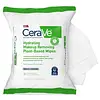What's inside
What's inside
 Key Ingredients
Key Ingredients

No key ingredients
 Benefits
Benefits

No benefits
 Concerns
Concerns

No concerns
 Ingredients Side-by-side
Ingredients Side-by-side

Water
Skin ConditioningIsohexadecane
EmollientIsopropyl Myristate
EmollientGlycerin
HumectantPEG-7 Glyceryl Cocoate
EmulsifyingHexylene Glycol
EmulsifyingDicaprylyl Ether
EmollientCeramide NP
Skin ConditioningCeramide AP
Skin ConditioningCeramide EOP
Skin ConditioningCarbomer
Emulsion StabilisingTriethyl Citrate
MaskingSodium Hydroxide
BufferingSodium Lauroyl Lactylate
EmulsifyingCholesterol
EmollientPiroctone Olamine
PreservativeTocopherol
AntioxidantHydroxyacetophenone
AntioxidantCaprylyl Glycol
EmollientCitric Acid
BufferingTrisodium Ethylenediamine Disuccinate
Phytosphingosine
Skin ConditioningXanthan Gum
EmulsifyingAcrylates/C10-30 Alkyl Acrylate Crosspolymer
Emulsion StabilisingBenzoic Acid
MaskingWater, Isohexadecane, Isopropyl Myristate, Glycerin, PEG-7 Glyceryl Cocoate, Hexylene Glycol, Dicaprylyl Ether, Ceramide NP, Ceramide AP, Ceramide EOP, Carbomer, Triethyl Citrate, Sodium Hydroxide, Sodium Lauroyl Lactylate, Cholesterol, Piroctone Olamine, Tocopherol, Hydroxyacetophenone, Caprylyl Glycol, Citric Acid, Trisodium Ethylenediamine Disuccinate, Phytosphingosine, Xanthan Gum, Acrylates/C10-30 Alkyl Acrylate Crosspolymer, Benzoic Acid
 Reviews
Reviews

Ingredients Explained
These ingredients are found in both products.
Ingredients higher up in an ingredient list are typically present in a larger amount.
Acrylates/C10-30 Alkyl Acrylate Crosspolymer is a synthetic polymer. It is used to thicken and improve the texture of products. Due to its properties, it can prevent water and oil ingredients from separating.
Hexylene Glycol is a surfactant. Glycols are a class of alcohols. Hexylene Glycol is a surfactant and emulsifier.
As a surfactant, Hexylene Glycol helps gather dirt and oil on your skin to be washed away.
As an emulsifier, Hexylene Glycol helps keep water and oil together. This prevents them from separating in a product. Hexylene Glycol also thins out the texture of a product by lessening viscosity.
Hexylene Glycol has a small molecular weight.
Learn more about Hexylene GlycolSodium Hydroxide is also known as lye or caustic soda. It is used to adjust the pH of products; many ingredients require a specific pH to be effective.
In small amounts, sodium hydroxide is considered safe to use. However, large amounts may cause chemical burns due to its high alkaline.
Your skin has a natural pH and acid mantle. This acid mantle helps prevent harmful bacteria from breaking through. The acid mantle also helps keep your skin hydrated.
"Alkaline" refers to a high pH level. A low pH level would be considered acidic.
Learn more about Sodium HydroxideWater. It's the most common cosmetic ingredient of all. You'll usually see it at the top of ingredient lists, meaning that it makes up the largest part of the product.
So why is it so popular? Water most often acts as a solvent - this means that it helps dissolve other ingredients into the formulation.
You'll also recognize water as that liquid we all need to stay alive. If you see this, drink a glass of water. Stay hydrated!
Learn more about Water